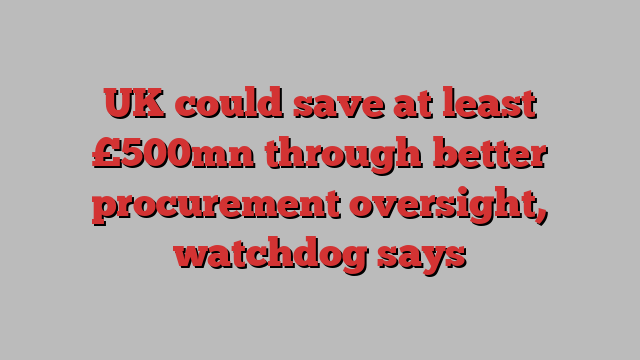
UK could save at least £500mn through better procurement oversight, watchdog says
Unlock the Editor’s Digest for free
Roula Khalaf, Editor of the FT, selects her favourite stories in this weekly newsletter.
At least £500mn of taxpayer money could be saved by the UK government if it increased its oversight of an estimated £125bn a year of procurement, parliament’s spending watchdog has warned.
The National Audit Office said Britain’s “decentralised” method of purchasing goods and services for the public sector made it hard for different organisations to share data easily or make savings through bulk buying.
“This fragmentation prevents the government from acting as a single buyer . . . resulting in duplication of effort and increasing bidding costs for suppliers,” the watchdog said in a report this week, warning Whitehall faced a “missed opportunity for greater efficiency”.
Public and private sector organisations bid for work through thousands of framework agreements — preapproved lists of suppliers with certain legal protections and conditions agreed in advance. These enable work to be awarded directly or with a mini-competition between the listed bidders.
The use of framework agreements has risen sharply in recent years. Independent procurement consultants estimate there are between 8,000 and 21,000, and public authorities spend a total of £125bn a year on the agreements, according to the NAO.
But ministers did not have “any oversight of the many frameworks or framework providers”, which charge fees for running the agreements, the NAO said.
Britain’s largest framework provider is the Crown Commercial Service, an arms-length body that could save the public sector £500mn over five years if it halved to 0.35 per cent the average levy it charged, according to the NAO report.
The CCS, which had 238 frameworks in the 2022-23 financial year, could also achieve wider savings by increasing bulk buying across the public sector, it added.
The CCS accounts for £25bn of the £125bn annual spend on services ranging from energy and technology to construction and estate management by public sector organisations including government departments, schools and hospitals.
But hundreds of the framework agreements are also being run by private providers on behalf of public authorities. The NAO said the fees charged by private providers pushed up the cost of government services and raised “concerns” over whether this system provides “value for money”.
The framework providers impose fees as high as 5-6 per cent of revenues if they win a contract, while some levy an additional charge on public authorities just to join a framework, according to the report.
The fees were priced into the cost of the contract and therefore “embedded in the price of goods and services”, the NAO said.
Three of the largest private sector providers of frameworks made a combined annual operating profit of £26mn in the last financial year, according to an NAO study.
The watchdog, which declined to name the companies, said framework providers “benefit from higher levels of public expenditure as this increases their income from levies, commissions and charges”.
The use of frameworks also made it more likely for contracts to be awarded without a full competition, the NAO added, noting that they raised the “cost of bidding for business for suppliers”.
The Local Government Association, which represents councils in England and Wales, told the NAO that a “duplication of framework agreements” caused “confusion for public sector organisations” and “increased time and costs”.
The Cabinet Office said: “We note the NAO’s report and will consider its findings. Crown Commercial Service’s purpose is to achieve maximum value for money across public sector procurement. In 2022-23, it delivered £3.8bn worth of commercial benefits through its agreements.”





